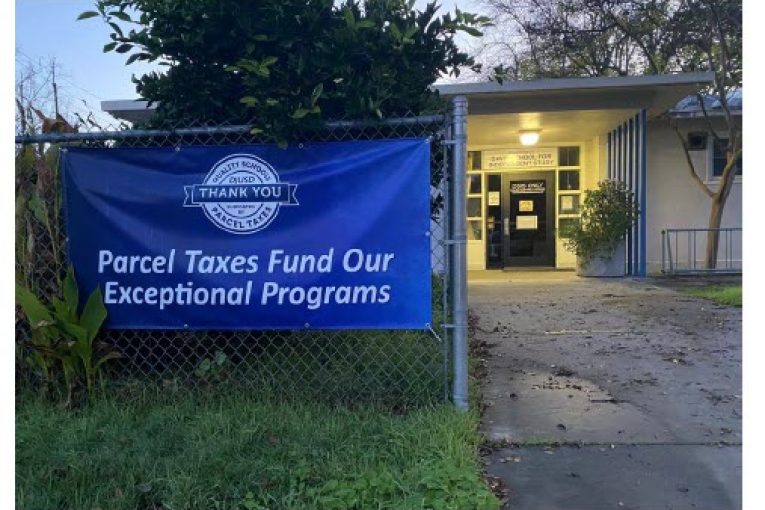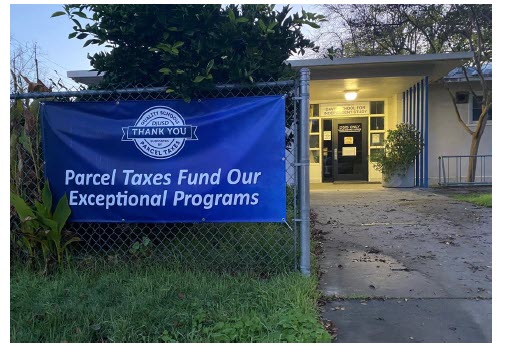

By David M. Greenwald
Executive Editor
Davis, CA – Someone was asking for my take on the parcel tax that will be voted on next week.
They said, “A very significant YES person is quietly telling people the tax is going down …”
If they are, they haven’t told me—whoever they are. I know a few people who have been canvassing in the field and they felt like they were mostly getting positive responses.
I was amused by the little vignette from Dunning’s column which related the ballot argument against Measure N, lamenting, “The days of glory in this District are gone.”
He goes on to say, “They are more interested in indoctrinating kids with gender-sexual ideology and anti-parent policies than teaching the basics of Civics, English, Math and Science.”
Dunning responds, “I’ve had six kids go through the Davis public schools and have two grandkids there now, so I have a pretty good sample on my hands. Somehow they all missed the indoctrination and anti-parent lessons. I guess they weren’t paying attention.”
From my perspective, I have not seen anything to indicate anything different about this round of voting in Davis other than the injection of the LGBTQ issue into the schools.
But, then again, I suppose it doesn’t take a huge change to defeat a parcel tax that  requires a two-thirds vote.
requires a two-thirds vote.
Still, over the last nearly 18 years since the first parcel tax I have covered, the range has been remarkably narrow. Opposition has been as high as 33 percent (meaning support was at a bare minimum 67%) to a low of 28 percent.
So what does a 34% opposition (the threshold for failure) look like compared to the 32% it was in 2020?
There is certainly nothing in the air that makes me believe there will be a wave of opposition to the parcel tax. The opposition seems to be planting the seed that there is some sort of silent majority out there. Maybe. But usually you see a sign of discontent.
But again, the margin between victory and defeat is so thin—would we even notice the difference between 32 and 34 percent opposition, except when they count the votes?
That does lead me to another thought—something I have been pointing out since at least 2018—the school district is surviving on extraordinarily thin margins.
If one of these parcel taxes happens to get 34 rather than 32 percent opposition, the whole business model of the district in effect implodes.
And the problem is that day is probably coming if for no other reason than an aging demographic. You have a shrinking portion of the population who have school age children. You have an increasing portion of the population who are over 60.
Davis remains a supportive community for its schools, but support for parcel tax falls off as people age. And those over 60 are still supportive of the parcel tax, but at a rate less than needed for passage—at least according to years of polling.
You couple that with the fact that the district is largely surviving or at least stabilizing based on out-of-district transfers and that’s something to worry about in the coming years. But probably not today.
Some of the opponents of the measure are arguing that the district should not be striving to make this parcel tax permanent with inflation adjustments. They argue that there is still time to vote down this parcel tax and then put a new one on the ballot that has a sunset date.
I guess I shouldn’t point this out—but you should always be a bit careful of what you wish for.
Despite the rhetoric of the no people, this parcel tax is basically a renewal of the previous one with an adjustment for inflation (people always seem to forget that the same dollar total today is less than it was four years ago) and it makes the tax permanent.
What they don’t attempt to do in this parcel tax is account for the loss in revenue from the state as a result of the budget crisis. A loss that is going to cause some staff to get laid off at the end of the year.
Given that, if this tax gets voted down, there is a good chance the next one will be larger. Moreover, while it is likely that a bare 50 percent, perhaps less, of the voters vote this time, in the fall, that number is going to likely exceed 80 percent which will actually make the electorate far more likely to support a tax than this one.
In short, you may end up with a far larger tax if this one goes down.
As always, a two-thirds vote is hard to attain, even in a community like Davis that always seems to come through for the schools. It wouldn’t take much for things to go the other direction.






